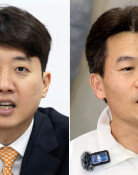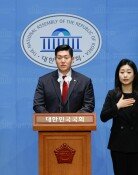New, Controversial Car Insurance Fees
New, Controversial Car Insurance Fees
Posted January. 10, 2006 08:36,
Under a controversial new auto insurance premium system, drivers have to pay extra when they violate traffic laws, even if they have not had a car accident.
The Korea Insurance Development Institute (KIDI) announced its ways to improve the additional premium system for auto insurance yesterday, which will charge additional premium as high as 20 percent when a driver violates a major traffic law.
Non-life insurance companies, which were expected to hail the move, raised doubts whether the new system will help reduce the industrys loss ratio (the ratio of claims divided by premiums), however.
Plans to Improve the Additional Premium System-
Starting September, when drivers buy insurance policies, the new system proposed by the KIDI will impose an additional 20 percent premium on drivers who, regardless of how many times they were caught, drive a car without drivers license or are involved in hit-and-run accidents occurring after this May.
When drivers drive under influence, they will see their premiums rise 10 percent for the first violation and 20 percent for their second violation. In the case of speeding (driving 20km/h or more over the speed limit), traffic light violations, and crossing yellow lines, drivers will get a five percent additional premium until their third violation, and a 10 percent charge after their fourth.
Controversy-
The auto insurance extra premium system has been in place since September 2000. The new scheme is designed to decrease the extra premium rate.
Non-life insurance companies that are sensitive to the incidence of traffic accidents have had an increased loss ratio since the adoption of the system in 2001, from 67.5 percent to 74.8 percent last year.
The extra premium system is no help to non-life insurance companies that are trying to lower their loss ratios, and the scheme is a mere stop-gap measure by the political sector, said An Byung-jae of the KIDI.
Consumers are complaining, too.
Cho Yeon-hang, executive officer of the Korea Insurance Consumer Federation (KICF) pointed out that There is no proven data that shows a driver who violates traffic laws is likely to have a car accident.
Some criticize the scheme for infringing on driver privacy by distributing information on breaking traffic laws, not accidents, to insurance companies.
According to regulations on private information, private information should not be disclosed to anybody unless an individual allows it or unless the data will be used for academic purposes. Insurance companies obtain private information according to exceptional regulations on insurance.
Countermeasures by Non-life Insurance Companies-
The Korea Non-life Insurance Association (KNIA) is expected to team up with various civic groups on traffic safety to launch a volunteer study group on traffic.
The group, comprised of about 3,000 people, will take pictures of cars that violate traffic laws at crossroads and near schools. This activity is different from that of carparazzi, (a word combination of car and paparazzi) because the group does not receive compensation for reporting the violations.
The KNIA plans to propose a sharp increase in penalties for speeding, drinking and driving, violating traffic lights, and habitual and intentional traffic violations to the government.
Suk-Min Hong smhong@donga.com




![‘노인 냄새’ 씻으면 없어질까?…“목욕보다 식단이 더 중요”[노화설계]](https://dimg.donga.com/c/138/175/90/1/wps/NEWS/IMAGE/2026/02/27/133434557.3.jpg)


